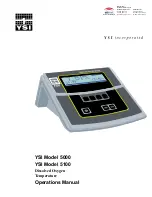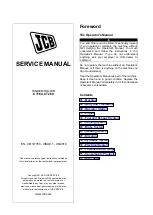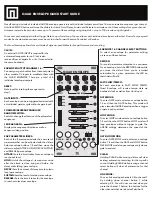
GOS-6200 OSCILLOSCOPE
USER MANUAL
⎯
54
⎯
1.
Set the VOLTS/DIV and VAR controls to provide an exact
five-division vertical display.
2.
Use the vertical POSITION control to control the negative amplitude
of the signal on the 0% reference line and the positive amplitude on
the 100% reference line.
3.
Increase the TIME/DIV setting to stretch out the rising edge of the
waveform as much as possible to improve the cursor placement
accuracy.
4.
Use the C1-POSITION control to align the cursor 1 to the rising
edge at the point where it crosses the 10% reference graticule line.
Then use the C2-POISITION control to align the cursor 2 to the
point where the rising edge crosses the 90% graticule line and read
the rise time displayed in the CRT readout.
(e).Typical 1/
△
T cursor function for frequency
measurement.
When the two cursors are superimposed at
two edge points of the one period waveform
by the C1-POSITION and C2-POSITION
controls, the measurement value is displayed
in frequency units on the upper side of the
screen.
(f).Typical
△
T%(Time difference percentage)
cursor function for duty-cycle measurement
of square waveform.
A time difference percentage measurement is
done by first setting a reference for the full
cycle of waveform period: 5div=100%.
GOS-6200 OSCILLOSCOPE
USER MANUAL
⎯
55
⎯
(g).Typical
△ Θ
cursor function for phase
measurement.
A phase measurement is done by first
setting a reference for the full 360
o
waveform period:
5div=360
o
.
NOTE. When the VOLTS/DIV or the TIME/DIV controls are in
uncalibrated setting, the
△
V and
△
T measurement values will be
displayed with divisions.
When the vertical mode is set to the ADD mode, and the CH1 and CH2
VOLTS/DIV controls are set to different scales, the
△
V measurement
values will be displayed with divisions.



































